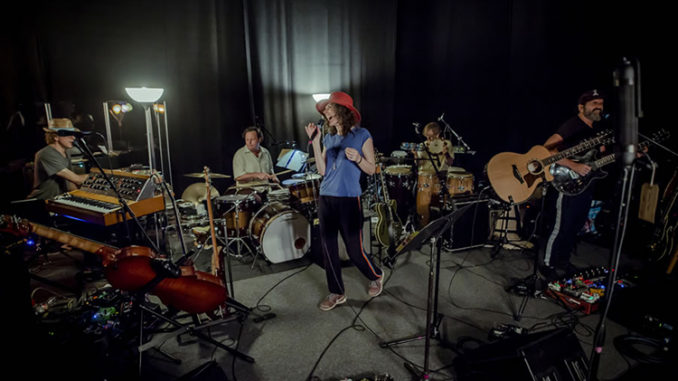
By Bernard Zuel.
Edie Brickell & The New Bohemians – Hunter And The Dog Star (Thirty Tigers)
It’s not just old man speak here when I say that longevity has its benefits. Not least, when things go right and stay right, in making anything, and sometimes everything, sound natural. Sound at ease. Sound like they were always meant to be exactly like this and no one has even had to give it a second thought.
It isn’t a given just because an entity has existed for more than 30 years, as is the case with Edie Brickell and the crew of The New Bohemians, whose first sighting for most of us was the laidback, two-drinks-in, half-lit bar groove of What I Am. Nor can it be assumed, even if – as is the case here – this is the second album in two years, a sign of creativity and connection after a break of 12 years.
(Which itself followed a break of 16 years from the group’s second album, after which Brickell picked up some New York kid called Paul Simon and gave him a home, three kids and maybe some writing tips.)

However, Brickell, guitarist Kenny Withrow, drummer Brandon Aly, percussionist John Bush and bassist Brad Houser, are so comfortably bound here, come at you with almost no visible sign of intent but merely the fact of their unified mood, that Hunter And The Dog Star just feels like you were in the joint before they started. Like this was exactly how you were feeling before you hit play and they had been clued in hours earlier.
The most visible, maybe even defining, element of this album is rhythm. Not the same rhythm mind you: Sleeve and Tripwire come with a brisk ‘80s Brits in sweaters movement; Don’t Get In The Bed Dirty shifts to a New York, circa Blondie’s Rapture, stride; I Don’t Know, the sardonic My Power and I Found You make their move to an uptown rooftop party; and if Horse’s Mouth is more likely to make a pair of cowboy boots dance, Stubborn Lovethrows forward to a casual spin on those tense, thrift store Strokes beats.
But in each of those tracks the Bohemians make the air shift enough to suggest bodies in motion while seemingly never working up a serious sweat themselves. They’re not uninterested or too cool; they’re just so comfortable in that pocket that it’s all coming without effort.
I imagine Bush is playing those congas in I Don’t Know with his eyes closed, a permanently unlit cigarette between his lips and a small smile at the corners of his mouth
It wouldn’t work though if Brickell wasn’t both loose enough to be draped over the microphone stand and sparkly-eyed enough to be throwing little lines of wryness at individuals in the room. Her observations in these vignettes are more often amused, even when describing a small town cliché being overturned in the finger picking nod to post-‘70s country, Rough Beginnings.
Then, when Miracles (intimations of cocktail club jazz and lightly smoked soul) and Evidence (a brief instrumental whose sprinkled lights turn into harsher layers of glare) shift your position, the distinguishing marks of difference are only evident in retrospect.
Which is no easy thing to pull off. Except here apparently, where things happen effortlessly.

